How Musicians Can Profit Using AI: Step-by-Step Guide & Examples
Many musicians struggle to make a living in the ever-changing music industry. AI technology offers exciting new ways to create and profit from music. This article will guide you step-by-step on how to use artificial intelligence for music production, marketing, live performances, and more.
Read on, and discover how AI can boost your musical career.
Understanding AI in Music Production
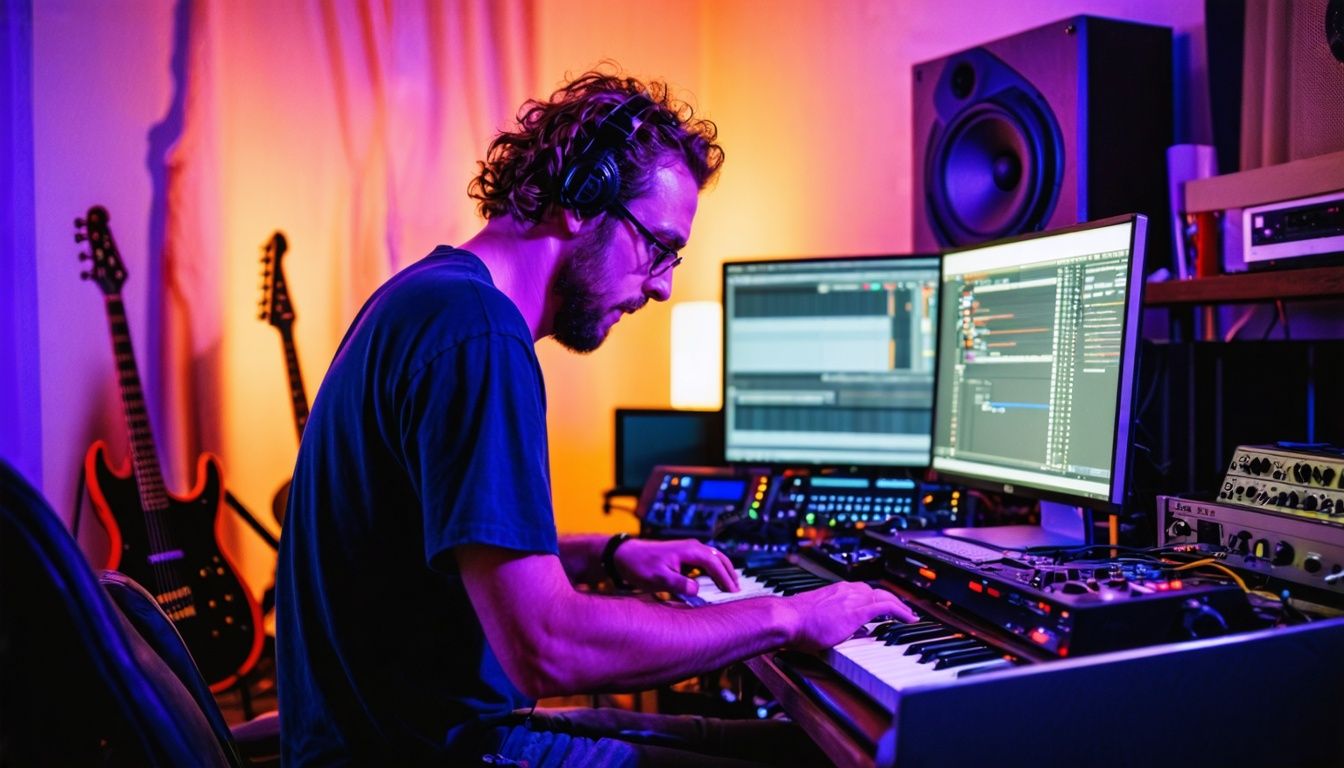
AI in music production has become a powerful tool for musicians. It helps create unique sounds and refine quality with precision.
AI-generated music composition
Artists can now create songs using AI tools without any music training. AIVIA, an AI music-generating platform, lets you produce tracks in multiple genres. Lo-Fi beats are especially popular and can be generated quickly on AIVIA.
You simply choose a genre, set the mood you want, and let the software handle the rest. This opens doors for musicians to create unique sounds effortlessly.
Several factors make AI-generated compositions appealing for various uses such as rap songs, video games, and instrumentals. The ability to produce consistent quality allows artists to focus more on creative aspects rather than technical details.
Musicians often find it easier to sell their AI-generated tracks online through platforms like Spotify or Apple Music due to this reliability.
AI makes it possible for anyone to become a music producer, says tech expert Lucy Adams.
AI-assisted mixing and mastering
iZotope Ozone offers an AI-powered solution for mixing and mastering music. This tool uses machine learning algorithms to analyze audio tracks and adjust EQ, compression, and other essential parameters.
These adjustments ensure consistency across all tracks, saving time that producers can allocate to the creative aspects of music production. iZotope Ozone’s automation capabilities help deliver optimized sound quality efficiently.
AI tools like AIVA and Mubert also contribute to audio services by simplifying complex tasks for both beginner and professional producers. Descript and Resound enhance audio editing with their intuitive user interfaces powered by natural language processing technologies.
By automating tedious tasks, these AI-based tools allow musicians to focus on artistry rather than technical details.
Creating AI-Generated Music
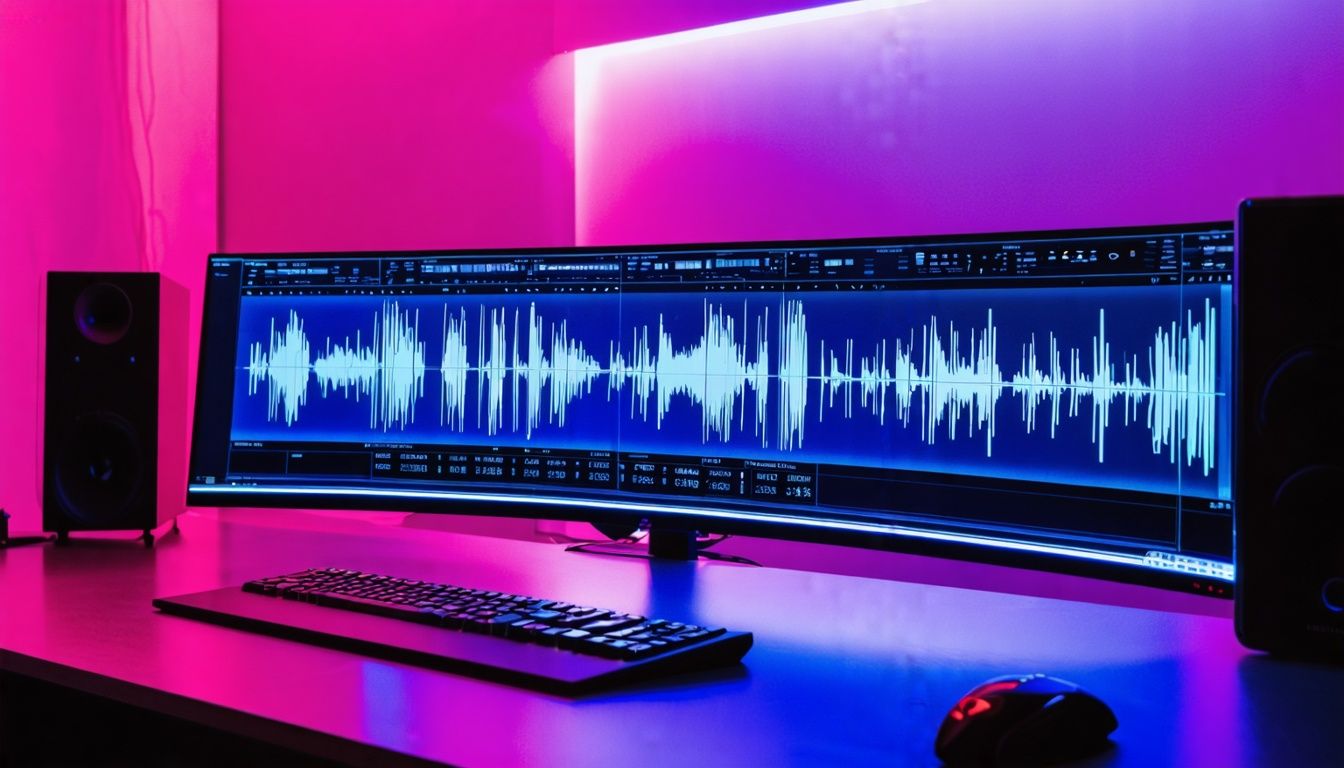
Choose the best AI software for your needs to begin making music. Use advanced tools like AIVA to create unique compositions easily.
Choosing the right AI software
Choosing the right AI software can transform your music production process. AIVA is an excellent choice for generating music across various genres, including Lo-Fi. It uses advanced algorithms to help create unique compositions effortlessly.
For mixing and mastering, iZotope Ozone stands out with its AI-powered tools that optimize EQ, compression, and other parameters automatically.
AI audio editing tools like Descript and Resound streamline audio services’ workflow by simplifying complex editing tasks. Tools such as Mubert offer a wide range of royalty-free tracks generated through artificial intelligence systems.
These software options ensure you produce high-quality music while saving time on technical details.
“AI allows musicians to push creative boundaries they never imagined possible.”
Generating music with AI tools like AIVA
Generating music with AI tools like AIVA is easy and fun. Follow these steps to create amazing tracks even if you have no music knowledge.
- Create an Account on AIVA
Sign up for a free account on the AIVA platform. Fill in basic information like your name, email, and password.
- Choose Your Music Genre
Select from various genres such as Lo-Fi, Classical, or Electronic. AIVA supports a wide range of styles.
- Customize Your Composition Settings
Adjust settings such as tempo, key, and mood to align with your creative vision. This allows you to personalize the output.
- Generate Your First Track
Click the “Create” button to let AIVA generate a unique track based on your preferences. Wait a few seconds for processing.
- Edit with AI Audio Tools
Use additional AI tools like Descript or Resound for fine-tuning your track. These tools help in noise reduction and enhancing sound quality.
- Export Your Finished Track
Download the final version in formats like MP3 or WAV directly from AIVA’s platform for easy sharing and distribution.
After generating music with AI tools like AIVA, explore how to market your AI-generated music effectively using social media platforms and other channels.
Marketing Your AI-Generated Music
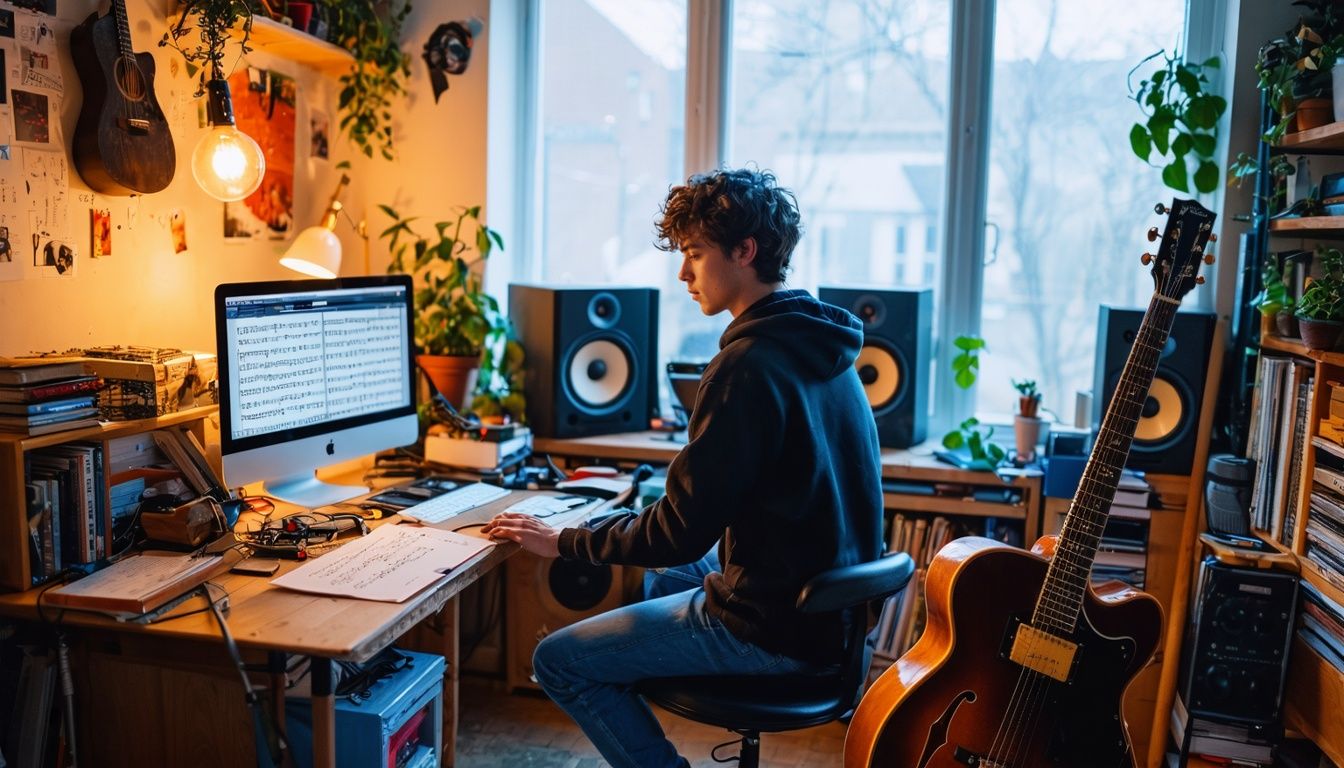
Share your AI-generated music on social media platforms to reach a wider audience. Sell your tracks on popular music platforms for extra income.
Utilizing social media platforms
Promote AI-generated music on platforms like TikTok, Instagram, and Twitter. TikTok trends can help songs go viral, as seen with Ghostrider 977’s “Heart on My Sleeve,” which hit over 10 million views.
Use AI tools such as Adzooma for targeted social media advertising to reach the right audience efficiently.
Automate post creation and scheduling using AI software to maintain a consistent online presence. Tools like WordStream offer custom pricing options for tailored solutions. Utilize analytics insights from these platforms to determine optimal posting schedules and boost engagement on YouTube and other sites.
Social media is not a media. The key is to listen, engage, and build relationships. – David Alston
Selling on music platforms like Spotify and Apple Music
AI-generated music can reach a global audience by selling on platforms like Spotify and Apple Music. “Heart on My Sleeve” by Ghostrider 977, an AI-created track, gathered over 10 million views.
Use AI tools such as AIVA for music creation. Maintain high-quality standards with audio editing tools like Descript and Resound.
Once your tracks are ready, upload them to Spotify and Apple Music through distributors like TuneCore or DistroKid. These services manage the licensing agreements and royalty payments for you.
Utilize predictive analytics in marketing campaigns to target listeners who match your genre or style effectively. With strategic marketing efforts on social media platforms, drive traffic towards these streaming services to boost profits from every play of your AI-generated songs.
Using AI for Live Performances
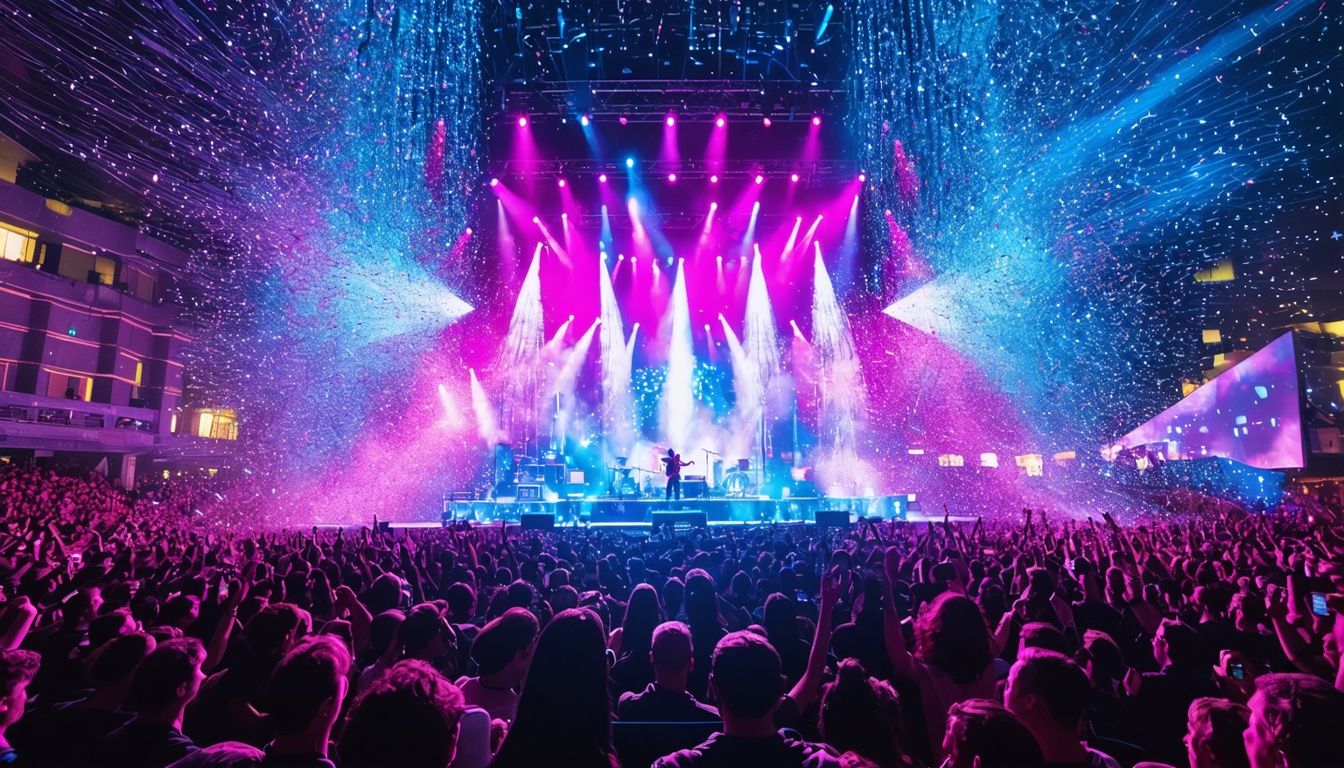
Musicians can use AI to create stunning visual effects during live shows. These visuals sync with the music for a captivating audience experience.
Enhancing live shows with AI visuals
AI visuals can transform live music shows into unforgettable experiences. Tools like those used for AI-generated art create stunning, dynamic backgrounds that sync with the beat and mood of the performance.
Imagine a concert where digital canvases shift colors and forms to match every note played. AI-powered software helps artists project spectacular light shows and holograms, immersing audiences in a more engaging environment.
Artists like xxxtentacion have utilized these advanced technologies to elevate their stage presence. Data analytics allows real-time adjustments, ensuring visuals are always on point.
With tools such as Luminar and Adobe Lightroom enhancing productivity for graphic design professionals, musicians can now focus more on their art while still delivering high-quality visual content during performances.
AI is changing the game in live music by merging sound with sight, says renowned digital marketer John Doe.
Implementing AI in live sound engineering
Implementing AI in live sound engineering boosts the quality and consistency of performances. Tools like iZotope Ozone use machine learning to analyze audio tracks, adjusting EQ, compression, and other parameters automatically.
This allows sound engineers to focus on creative aspects while ensuring optimal sound throughout the event.
AI-powered solutions can also manage real-time audio adjustments during a live show. These systems detect issues such as feedback or volume fluctuations and make instant corrections.
By incorporating AI, venues enhance their overall audio performance, making shows more enjoyable for audiences and musicians alike.
Collaboration Opportunities with AI
Musicians can team up with AI to create one-of-a-kind compositions. They can also work with AI developers to build custom music solutions.
Collaborating with AI for unique compositions
Partnering with AI developers can lead to unique compositions that stand out in the music industry. For example, using platforms like AIVIA allows artists to create songs across various genres, including Lo-Fi beats.
This collaboration not only streamlines the creative process but also opens up new opportunities for generating income. Imagine creating a hit like “Heart on My Sleeve” by Ghostrider 977, which garnered over 10 million views.
AI tools aid musicians by offering innovative solutions tailored to their needs. Musicians can experiment with different styles and sounds without legal issues related to borrowing other artists’ voices.
Utilizing these AI-driven technologies helps diversify an artist’s portfolio and gains traction in competitive markets such as Spotify and Apple Music.
Partnering with AI developers for custom solutions
Working with AI developers can create unique music experiences. They can use tools like Copilot and Descript to develop custom audio solutions. Collaborating with experts in artificial intelligence (AI) allows musicians to craft personalized compositions or enhance live performances using speech recognition technology.
Musicians also benefit from advanced AI applications for efficient mixing and mastering. Tools such as AIVA and Mubert enable the creation of distinctive soundscapes, catering specifically to an artist’s needs.
With these technologies, you can elevate your music production while saving time and effort on manual tasks.
Monetizing AI Skills in Music
Musicians can freelance as AI music producers to create custom tracks. They can also offer online courses teaching AI music production skills.
Freelancing as an AI music producer
Freelancing as an AI music producer offers a unique way to earn money. You can create and sell Lo-Fi beats online, avoiding legal issues thanks to the originality of your work. Platforms like Fiverr and Upwork allow you to find clients in need of custom music compositions or sound design using AI tools such as AIVA and Mubert.
Offering online courses on AI music production adds another revenue stream. You can teach others how to use software like Descript for audio editing or Copilot for app development.
Social media platforms help market these services effectively, reaching potential students worldwide. This approach not only diversifies income but also builds your reputation in the industry.
Offering online courses on AI music production
Offer online courses on AI music production using platforms like Udemy and Coursera. These platforms allow you to reach a global audience, sharing your skills with eager learners. Create engaging content by leveraging tools such as ChatGPT for crafting conversational scripts and AIVA for demonstrating practical examples in music generation.
Utilize Descript and Resound to produce polished video lessons that showcase high-quality audio editing techniques. Explain how AI tools like Mubert can aid in real-time music creation.
Highlight the benefits of Splice’s vast collection of royalty-free samples to enhance students’ creativity. Teach marketing strategies for their AI-generated music on social media platforms, preparing them for successful careers as freelance AI music producers.
For more collaboration opportunities with AI…
Additional Revenue Streams
Licensing AI-generated music can open new doors for income. Creating sound libraries tailored to different genres is another way to earn money.
Licensing AI-generated music
Artists can monetize their AI-generated tracks through licensing. Platforms like Spotify and Apple Music allow musicians to sell their music, while others like Descript and Resound assist in the production process.
Using these tools can help artists create high-quality soundtracks that attract more listeners.
Selling Lo-Fi beats online offers a practical way to avoid legal issues. The track “Heart on My Sleeve” by Ghostrider 977 reached over 10 million streams, showing the significant potential for success.
Licensing such music ensures creators retain control of their work while generating income from various platforms.
Creating sound libraries for AI software
Creating sound libraries for AI software involves gathering a collection of unique audio samples. Tools like Splice offer royalty-free samples, which give musicians more creative control.
Descript and Resound can further refine these sounds with precise editing capabilities.
Musicians can sell these curated libraries to developers working on AI applications. These sound libraries become valuable resources for machine-learning projects that need diverse audio inputs.
By leveraging platforms like Amazon Web Services, creators can easily distribute their collections online. This venture not only creates new revenue streams but also integrates seamlessly into the booming field of AI technology.
Navigating Legal Considerations
Understanding copyright with AI-generated music is crucial. Ensure compliance with existing music rights and licensing laws to avoid legal trouble.
Understanding copyright with AI-generated content
Copyright laws become tricky with AI-generated content. Current rules cover music made by human artists, but AI music doesn’t fit neatly into these categories. Creators must ensure they don’t infringe on pre-existing works already under copyright protection.
This involves checking that the AI doesn’t use melodies or elements from copyrighted songs without permission.
The usage of an artist’s voice through voice cloning tools adds another layer of complexity. Some platforms have inconsistent policies regarding AI-generated art versus music, adding to the confusion.
There are no specific laws against using AI to create tracks mimicking deceased artists’ voices, leading to ethical debates and possible legal gray areas. Musicians leveraging AI need clear agreements and should follow platform guidelines closely while staying updated on evolving regulations in digital marketing and sales platforms like Spotify and Apple Music.
Ensuring compliance with music rights
Understanding copyright laws is essential for musicians using AI tools. The legality of creating or remixing music from an artist’s voice remains unclear due to the lack of specific regulations.
For instance, generating a song using AI software like OpenAI API without proper permissions can lead to legal challenges. Artists must ensure they have the right licenses before incorporating any pre-existing music elements.
AI-generated art and music face inconsistent platform policies, which complicates compliance efforts. Musicians need to navigate these policies carefully on platforms such as Spotify and Apple Music to avoid violations.
This also includes ethical considerations when using AI for recreating deceased artists’ voices, prompting debates within the industry over what should be permissible. By staying informed about current laws and making responsible choices, musicians can ethically profit from their AI-generated works while respecting existing rights holders.
Conclusion
Musicians can use AI chatbots to connect with their target audience and gather feedback on new tracks. AI tools like TensorFlow help create stunning visuals to enhance live performances, making shows more engaging.
Freelancers in music production can offer services using platforms like WordPress to build professional websites showcasing their AI-generated work. Utilizing social media for marketing increases exposure and helps sell music on platforms such as Spotify and Apple Music.
Creating sound libraries for AI software also opens up additional revenue streams while ensuring compliance with copyright laws keeps everything legal.
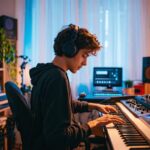


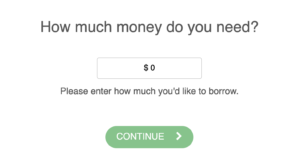
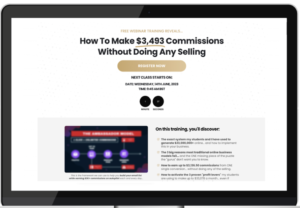

Leave a Reply